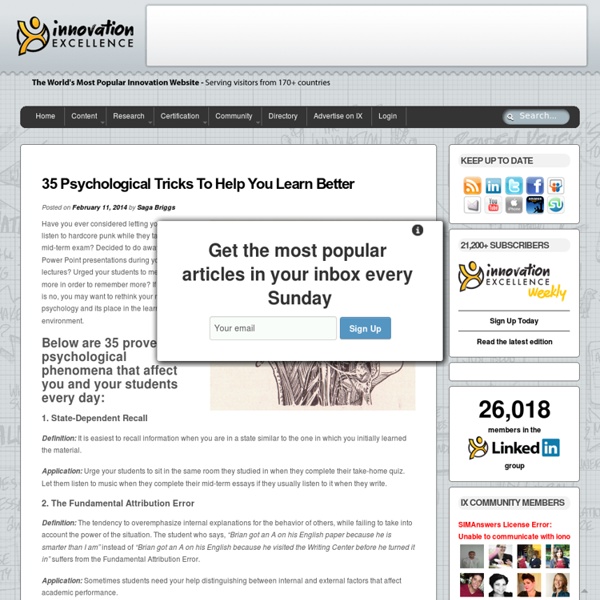A Learning Secret: Don’t Take Notes with a Laptop
“More is better.” From the number of gigs in a cellular data plan to the horsepower in a pickup truck, this mantra is ubiquitous in American culture. When it comes to college students, the belief that more is better may underlie their widely-held view that laptops in the classroom enhance their academic performance. Obviously it is advantageous to draft more complete notes that precisely capture the course content and allow for a verbatim review of the material at a later date. What drives this paradoxical finding? To evaluate this theory, Mueller and Oppenheimer assessed the content of notes taken by hand versus laptop. If the source of the advantage for longhand notes derives from the conceptual processes they evoke, perhaps instructing laptop users to draft summative rather than verbatim notes will boost performance. Wrong again. Beyond altering students’ cognitive processes and thereby reducing learning, laptops pose other threats in the classroom.
From Self-Discovery to Learning Agility in Senior Executives by Suzanne Goebel, Richard Baskerville
Suzanne Goebel Georgia State University Richard Baskerville Georgia State UniversitySeptember 20, 2013 Third Annual International Conference on Engaged Management Scholarship, Atlanta, Georgia. Abstract: In the complex world of the senior executive, one of the single most important predictors of executive success is learning agility. Number of Pages in PDF File: 19 Keywords: Learning Agility, Mental Agility, Self-Awareness, Executive Coaching, Resilience, Managing Uncertainty, Managing Change, Dealing With Ambiguity, Reflection, Metacognition, Complex Learning, Managing Complexity
Anki Flashcards - powerful, intelligent flashcards
zenhabits
untitled
Learning Techniques
One of the things that we expect you to pick up by osmosis, but almost never mention explicitly, is techniques for learning itself. After you leave university, you will be expected to be able to learn by yourself for the rest of your life. And an hour spent addressing the meta-issue of learning skills pays off in reduced time to actually learn. A lot of work has been done over the past few decades about how people learn. I recommend the work on accelerated learning by Colin Rose and Brian Tracy. You can learn anything if you have a goal that requires it. There are a number of stages to learning, each of which involves a number of aspects. The right state of mind There are six aspects to being in the right state of mind to learn. Here are the six aspects: Find a personal reason to want to learn this material. A variety of ways of input Here is a list of ways you can use variety in getting new material: Play to your strengths in terms of how you process information. Memorising Showing you know
Learn Difficult Concepts with the ADEPT Method
After a decade of writing explanations, I’ve simplified the strategy I use to get new concepts to click. Make explanations ADEPT: Use an Analogy, Diagram, Example, Plain-English description, and then a Technical description. Here’s how to teach yourself a difficult idea, or explain one to others. Analogy: What Else Is It Like? Most new concepts are variations, extensions, or combinations of what we already know. In our decades of life, we’ve encountered thousands of objects and experiences. Here’s an example: Imaginary numbers. Argh. Negative numbers were distrusted until the 1700s: How could you have less than nothing? Instead of just going East/West, we can go North/South too – or even spin around in a circle. Analogies are fuzzy, not 100% accurate, and yet astoundingly useful. Diagram: Engage That Half Of Your Brain We often think diagrams are a crutch if you aren’t macho enough to directly interpret the symbols. So, here’s a visualization: Example: Let Me Experience The Idea Nope. so Prof.
Beating the Forgetting Curve with Distributed Practice
“If you read the research on how much people forget after training, it’s depressing. Do a search for the ‘Forgetting Curve’. Once we know something like this, we need to change our approach and educate others.”- Connie Malamed (The eLearning Coach)The above quote is from our interview with Connie Malamed. After our inspiring and thought-provoking interview with Connie Malamed, we were left wondering about the interesting human nature that is revealed with the ‘forgetting curve’, and its impact on learning design. We set out on a journey to explore and learn more about this phenomenon.Below are the questions we had in mind when we embarked on our journey: What is the ‘forgetting curve’? One of the most intriguing features of the human mind is that it is volatile in nature (just like the Random Access Memory (RAM) in a computer). These findings have great significance for learning professionals while developing learning interventions. Excerpts from Experts Infographics Presentations Articles
The 27 Principles to Teaching Yourself Anything (aka The Self-Guided Education Manifesto + PDF download
“I have never let my schooling interfere with my education.” —Mark Twain Note: This post is intentionally long. At the end of this post I’ve even provided two free PDF downloads to further guide you towards learning what matters (one is a list of over 30 of the best online resources for creating your own passion-filled curriculum). Enter the Unofficial Self-Guided Education Manifesto… Last week’s article on The Birth of Self-Guided Education caught like wildfire. When that happens, I know a topic deserves some respect. Many of last week’s comments blew my mind. Living Legends create their own education. The truth of the matter is every Living Legend (whether they dropped out of high school or got a couple PhD’s) took their education and their learning into their own hands. For years I’ve been wanting to create a separate business on this topic but given the awesome momentum we’ve drummed up here, I say we run with it… So without further ado… 1. 2. 3. 4. 5. 6. 7. 8. 9. 10. 11. 12. 13. 14. 1.



